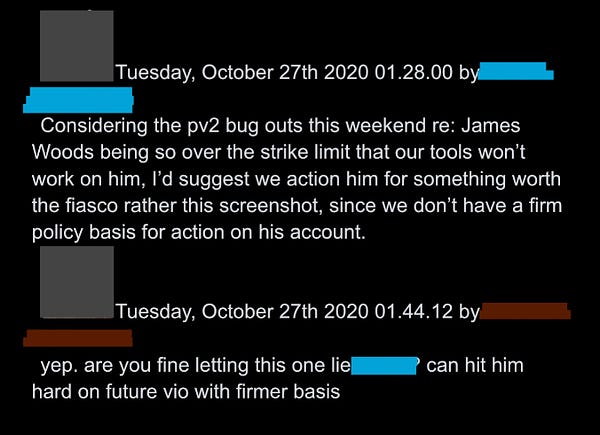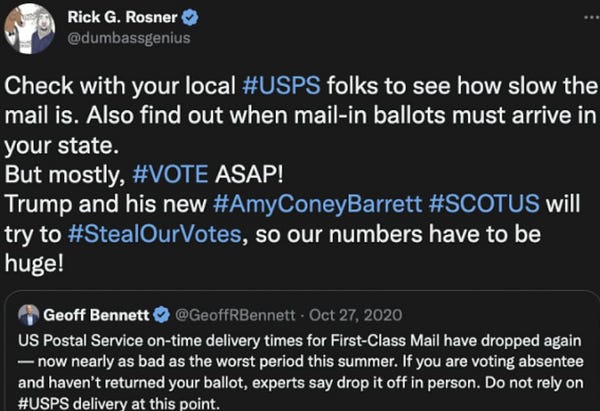Highlights from this weekend's Elon Musk "Twitter Files"
Catch up on the most recent revelations from Twitter's internal documents.
As we expected, Elon Musk continues to release Twitter’s internal documents concerning censorship and political bias. He has followed up last weekend’s report from journalist Matt Taibbi with three more releases.
I’ve summarized some of the highlights below, and provided links to the relevant Twitter threads so you can read the original reporting on your own.
Twitter Files 2: Shadowbanning
The second batch of Twitter documents was released to former New York Times editor and founder of The Free Press, Bari Weiss. This batch focuses on the practice of “shadowbanning” - when a social media company secretly blocks a user’s account, posts or comments from being visible to other users.
Weiss explains how shadowbanning worked on Twitter:


Weiss provides four examples of accounts that were shadowbanned: Stanford medical professor Dr. Jay Bhattacharya, conservative talk radio host Dan Bongino, and conservative activists Charlie Kirk and LibsofTikTok. What these four individuals have in common is that they have significant social media followings and offer perspectives that counter liberal orthodoxy and Democratic Party positions on a wide range of issues.
The power to shadowban appears to have been used in a politically biased way to target Twitter accounts on the right side of the political spectrum.
This reporting also offers a window into the rationalizations offered by Twitter’s then-Head of Trust and Safety, Yoel Roth. Roth is quoted as saying:

Of course, the key question here is who decided what constitutes misinformation? At Twitter, it was a small, secretive group of influential managers and executives who were not bound by any objective policies or procedures.



Twitter Files 3: Political Bias Intensifies
The third batch of Twitter documents went to the man who kicked things off last weekend, Matt Taibbi. Taibbi reports on the intensification of political bias at Twitter, which creates the context for the eventual suspension of Donald Trump in January 2021.
Taibbi explains that in the months leading up to the suspension of Trump’s account, Twitter’s censorship practices became more frequent and employees were frustrated that company policies did not enable them to do more. For example, Hollywood actor James Woods makes another appearance in these documents, expressing concern over a label that Twitter placed on a Trump tweet in October 2020. Twitter employees debate how to respond, and state clearly that they don’t have a policy justification to consider Woods in violation.




When talking about Woods, Twitter employees state they want to “hit him hard.” But, when they speak about Democrats engaged in potential misinformation, Twitter employees sing a different tune. For example, when Hollywood comedian Elijah Daniel and Hollywood writer Rick Rosner accused the U.S. Supreme Court of trying to “steal the election” from Joe Biden, Twitter employees found no reason to be concerned.






Twitter Files 4: Trump’s Gone
Michael Shellenberger, author of Apocalypse Never and former independent candidate for Governor of California, reported on the fourth batch of Twitter documents. This time, we see exactly how Twitter decided to suspend Donald Trump, which was controversial across the political spectrum. World leaders like Emmanuel Macron and Angela Merkel, who rarely agreed with Trump on anything, opposed Twitter’s decision at the time.
Then-CEO of Twitter, Jack Dorsey, initially resisted the idea of suspending Trump. However, he eventually succumbed to internal pressure, leading to a five-strike system to justify the suspension of accounts.


Unfortunately for some Twitter employees, this new system didn’t give them permission to suspend Trump, which is ultimately what they wanted to do.


Trump’s involvement in the January 6 U.S. capitol attack ultimately provided the justification for suspension based on “incitement to violence.”


However, there remained no internal policy justification for suspending Trump. There was no objective standard created that could then be applied to politicians, public figures or other users. One junior employee pointed this out, but it doesn’t appear his or her concerns were responded to in the company’s Slack chat.


Additional Twitter files will be released soon. I will do another summary later in the week if interesting insights are revealed.


Thanks for the well researched summary, Jamil. It is telling how little air play this has gotten in the MSM. Imagine if things were reversed and Twitter leaned right? There would be no end to the outrage.
Next, I wonder how much , if any of this activity applied to Canada. I saw where a senior Twitter official, who has since departed the company, is also a senior board member on the Trudeau foundation. Let’s hope any nefarious activity re Canada will be released in due course by Elon. Keep up the great work Jamil!
Great recap! thank you Jamil